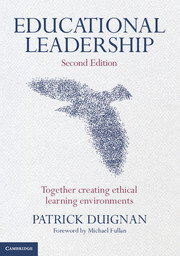Book contents
- Frontmatter
- Foreword
- Contents
- Acknowledgements
- INTRODUCTION AND OVERVIEW
- CHAPTER 1 THE CHANGING AND CHALLENGING CONTEXT FOR EDUCATIONAL LEADERS
- CHAPTER 2 KEY MACRO CHALLENGES FOR EDUCATIONAL LEADERS
- CHAPTER 3 KEY MICRO CHALLENGES FOR EDUCATIONAL LEADERS
- CHAPTER 4 LEADERSHIP CHALLENGES AS TENSIONS
- CHAPTER 5 A FRAMEWORK FOR ANALYSING ETHICAL TENSIONS
- CHAPTER 6 VISION-INSPIRED LEADERSHIP AND ETHICAL DECISION-MAKING
- CHAPTER 7 BUILDING A COLLECTIVE ETHIC OF RESPONSIBILITY FOR LEADERSHIP IN SCHOOLS
- CHAPTER 8 AUTHENTIC LEADERS USE THE POWER OF PRESENCE, AUTHENTIC RELATIONSHIPS, AND INFLUENCE FIELDS
- CHAPTER 9 AUTHENTIC LEADERS HELP CREATE INNOVATING, DEEP, RICH LEARNING ENVIRONMENTS
- CHAPTER 10 FORMING CAPABLE AND AUTHENTIC LEADERS: TRANSFORMATIONAL LEARNING APPROACHES
- References
- Index
CHAPTER 5 - A FRAMEWORK FOR ANALYSING ETHICAL TENSIONS
Published online by Cambridge University Press: 05 June 2012
- Frontmatter
- Foreword
- Contents
- Acknowledgements
- INTRODUCTION AND OVERVIEW
- CHAPTER 1 THE CHANGING AND CHALLENGING CONTEXT FOR EDUCATIONAL LEADERS
- CHAPTER 2 KEY MACRO CHALLENGES FOR EDUCATIONAL LEADERS
- CHAPTER 3 KEY MICRO CHALLENGES FOR EDUCATIONAL LEADERS
- CHAPTER 4 LEADERSHIP CHALLENGES AS TENSIONS
- CHAPTER 5 A FRAMEWORK FOR ANALYSING ETHICAL TENSIONS
- CHAPTER 6 VISION-INSPIRED LEADERSHIP AND ETHICAL DECISION-MAKING
- CHAPTER 7 BUILDING A COLLECTIVE ETHIC OF RESPONSIBILITY FOR LEADERSHIP IN SCHOOLS
- CHAPTER 8 AUTHENTIC LEADERS USE THE POWER OF PRESENCE, AUTHENTIC RELATIONSHIPS, AND INFLUENCE FIELDS
- CHAPTER 9 AUTHENTIC LEADERS HELP CREATE INNOVATING, DEEP, RICH LEARNING ENVIRONMENTS
- CHAPTER 10 FORMING CAPABLE AND AUTHENTIC LEADERS: TRANSFORMATIONAL LEARNING APPROACHES
- References
- Index
Summary
The challenges and tensions faced by educational leaders in this study and discussed, primarily, in chapters 3 and 4, are complex and difficult to resolve. They created ambiguities and uncertainty for those trying to decide which response is likely to be the most successful. An important finding to emerge was that most of the leaders in the study had no rigorous and systematic method for analysing and responding to the tensions. In other words, in such situations they were often flying blind or trusting their intuition.
It seems clear that educational leaders require frames of reference and decision guidelines for making choices in situations that seem to present opposing values and ethical positions. This need is not well accepted, never mind understood or appreciated, by a majority of those who study and practice educational leadership and management. The traditional perspective of a world of certainty and precision that can be controlled through tried-and-true management processes and techniques, still tends to dominate educational leadership thinking and practice.
Frameworks are needed, particularly, to help educational leaders appreciate that just because the forces operating in a situation appear to be contradictory, even irreconcilable, the situation is not intractable or irresolvable. Handy, in his 1994 influential commentary on leadership dilemmas, provides valuable insights into the nature of a tension or dilemma and on how to respond to them.
- Type
- Chapter
- Information
- Educational LeadershipTogether Creating Ethical Learning Environments, pp. 76 - 90Publisher: Cambridge University PressPrint publication year: 2012



